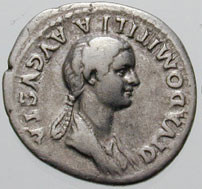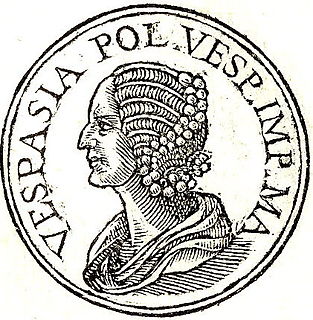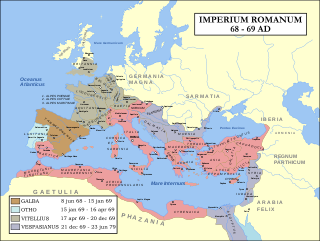 W
WThe Flavian dynasty ruled the Roman Empire between AD 69 and 96, encompassing the reigns of Vespasian (69–79), and his two sons Titus (79–81) and Domitian (81–96). The Flavians rose to power during the civil war of 69, known as the Year of the Four Emperors. After Galba and Otho died in quick succession, Vitellius became emperor in mid 69. His claim to the throne was quickly challenged by legions stationed in the Eastern provinces, who declared their commander Vespasian emperor in his place. The Second Battle of Bedriacum tilted the balance decisively in favour of the Flavian forces, who entered Rome on December 20. The following day, the Roman Senate officially declared Vespasian emperor of the Roman Empire, thus commencing the Flavian dynasty. Although the dynasty proved to be short-lived, several significant historic, economic and military events took place during their reign.
 W
WArrecina Tertulla was a Roman woman who lived in the 1st century. She came from obscure origins and her family were of Equestrian rank.
 W
WDomitian was Roman emperor from 81 to 96. He was the son of Vespasian and the younger brother of Titus, his two predecessors on the throne, and the last member of the Flavian dynasty. During his reign, the authoritarian nature of his rule put him at sharp odds with the Senate, whose powers he drastically curtailed.
 W
WFlavia Domitilla Major Flavia Domitilla the Elder or Domitilla the Elder was the wife of the Roman Emperor Vespasian.
 W
WFlavia Domitilla the Younger or Flavia Domitilla Minor was the only daughter of the Roman Emperor Vespasian.
 W
WFlavia Domitilla, daughter of Domitilla the Younger by an unknown father, perhaps Quintus Petillius Cerialis, had the same name as her mother and her grandmother Domitilla the Elder. She was thus a granddaughter of Emperor Vespasian and a niece of Emperors Titus and Domitian. She married her cousin, the consul Titus Flavius Clemens, a grand-nephew of Vespasian through his father Titus Flavius Sabinus.
 W
WGnaeus Domitius Corbulo was a popular Roman general, brother-in-law of the emperor Caligula and father-in-law of Domitian. The emperor Nero, highly fearful of Corbulo's reputation, ordered him to commit suicide, which the general carried out faithfully, exclaiming "Axios", meaning "I am worthy", and fell on his own sword.
 W
WFlavian art is the artistic production of the Roman Empire during the Flavian dynasty from 69 to 96 AD.
 W
WMarcia Furnilla was a Roman noblewoman who lived in the 1st century. Furnilla was the second and last wife of the future Roman Emperor Titus.
 W
WJulia Flavia was the daughter and only child to Roman Emperor Titus from his second marriage to the well-connected Marcia Furnilla.
 W
WDomitia Longina was a Roman empress and wife to the Roman emperor Domitian. She was the youngest daughter of the general and consul Gnaeus Domitius Corbulo. Domitia divorced her first husband, Lucius Aelius Lamia Plautius Aelianus in order to marry Domitian in AD 71. The marriage produced only one son, whose early death is believed to have been the cause of a temporary rift between Domitia and her husband in AD 83. She became the empress upon Domitian's accession in AD 81, and remained so until his assassination in AD 96. She is believed to have died sometime between AD 126 and AD 130.
 W
WNerva was Roman emperor from 96 to 98. Nerva became emperor when aged almost 66, after a lifetime of imperial service under Nero and the rulers of the Flavian dynasty. Under Nero, he was a member of the imperial entourage and played a vital part in exposing the Pisonian conspiracy of 65. Later, as a loyalist to the Flavians, he attained consulships in 71 and 90 during the reigns of Vespasian and Domitian, respectively.
 W
WTitus was Roman emperor from 79 to 81. A member of the Flavian dynasty, Titus succeeded his father Vespasian upon his death.
 W
WVespasia Polla was the mother of the Roman emperor Vespasian, and grandmother to the emperors Titus and Domitian. Polla came from an equestrian family at Nursia.
 W
WVespasian was Roman emperor from 69 to 79. The fourth and last in the Year of the Four Emperors, he founded the Flavian dynasty that ruled the Empire for 27 years.
 W
WThe Year of the Four Emperors, 69 AD, was a period in the history of the Roman Empire in which four emperors ruled in succession: Galba, Otho, Vitellius, and Vespasian.